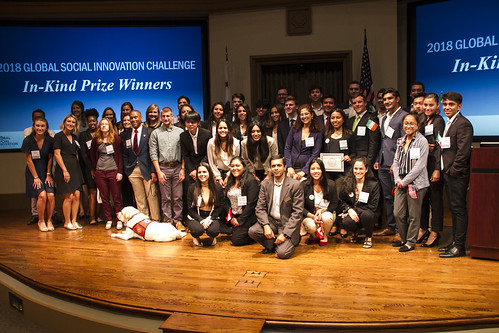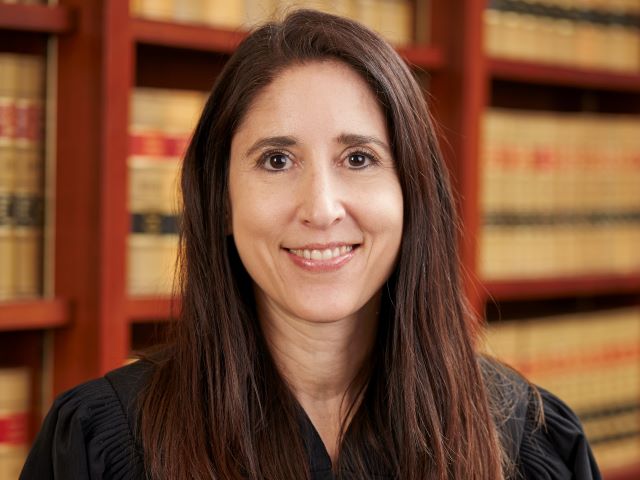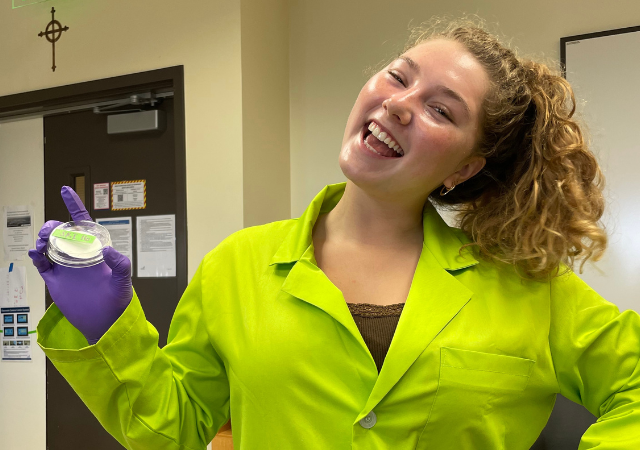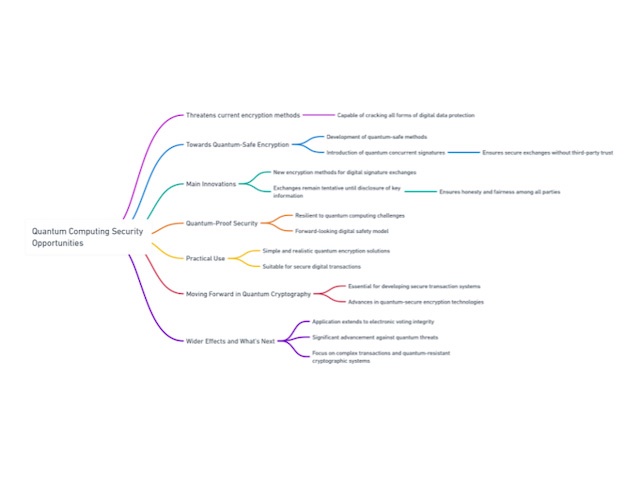Ireland, Ghana, Mexico Entrepreneurs Shine in Global Social Innovation Challenge
The University of San Diego's Center for Peace and Commerce hosted its first Global Social Innovation Challenge, an entrepreneurial showcase of ideas from college students worldwide, and Saturday’s results lived up to the event’s international billing.
Teams representing Ghana, Ireland and Mexico emerged as the biggest winners, earning the largest shares of CPC's $50,000 seed funding prize pool, and gained increased awareness for their projects, all of which were inspired by the United Nations' 17 Sustainable Development Goals (SDG).
The GSIC attracted 27 universities in 12 countries, six continents. In all, 42 teams pitched their ideas in USD's Joan B. Kroc Institute for Peace and Justice Theatre to judges. All teams, including two from USD, presented during a three-hour span Saturday morning to whittle the number to 10 finalists. The Garden of the Sky area hosted finalists and non-finalists to share their projects prior to the evening’s awards ceremony, which included a 90-second fast pitch by finalists.
Perhaps it came as no surprise that something that’s increasingly a concern around the world — mental health — secured two of the 10 finalist positions.
The largest overall amount of seed funding, $17,500, went to Dublin, Ireland's Trinity College team of Arthaud Mesnard, Aimee Louise Carton and Mathilde Francois-Downey for Keep Appy, a wellness mobile app that helps individuals take control of their mental health and physical well-being. The idea was connected to the UN’s SDG No. 3, Good Health and Well-Being. Keep Appy first earned a top prize of $2,500 in each of three $5,000 tracks — Women Innovators, Qualcomm Global Impact and Qualcomm Wireless Impact — and then received $10,000 in the general track.
“This just shows how important mental health is these days,” said Carton, whose Keep Appy was joined by another GSIC finalist, Mexico’s Be Happy, as projects determined to help with a solution. “We hope this is a wake-up call about mental health. We hope it is a point of change for this subject and to not have a stigma attached to it.”
The top individual prize in the general track, $15,000, went to Team Charcoal, consisting of Ghana’s Heritage Christian College students Evans Kwarkye, Austin Carboo and Benajmin Samuel Nketsia. They gave a strong presentation on converting human excreta into charcoal to reduce its health hazard and environmental impact. Charcoal is used by a majority of the population for cooking purposes. Their idea connects to UN SDG No. 6, Clean Water and Sanitation. In addition to the $15,000, Team Charcoal, which had been working on its idea since September 2017, earned an additional $1,500 as the top vote-getter in the audience choice award contest, which took place after the 10 finalists gave their quick pitch.
The third-highest funding, $10,500, was secured by Biogas del Hogar, a project from Mexico's CETYS Universidad students, Mariana Cristina Lara Gonzalez and Rocio Jazmin Ramirez Jimenez, and connected to SDG No. 7 for Affordable and Clean Energy. Their idea to produce biogas in a bio-digester from organic household waste earned them $1,500 each in the Qualcomm Global Impact and Women Innovators tracks, $500 as the third-place audience choice vote-getter, and $7,000 in the general track.
Others to receive cash awards were Juntas ($3,500), a project by Gabriela Delgado and Maria Jose Tamayo from Peru's Universidad del Pacifico to help prevent unplanned teenage pregnancy through non-traditional sex education methods; Sistema de Rescate ($1,000), a technological aid to provide rescue brigades with on-site information for better planning and decision-making, came courtesy of Tecnologico de Monterrey-Guadalajara students Gerardo Cano, Alfonso Carrillo, Arturo Fornios and Victor Gonzalez; and Bridge ($1,000), whose idea of an online marketplace to connect consumers to conscious companies and products was developed by four University of Kentucky students, Megan Van Son, Kristen McLaughlin, Taylor Wurth and Jenna Hazelbaker.
Four GSIC finalists — Linfochild (Mexico), Generation (United States), Be Happy (Mexico) and Estacion Meiquer (Mexico) — and 32 other teams were eligible and in many cases did receive in-kind prizes from CPC’s generous sponsors to further teams’ idea development and to enhance the team members’ entrepreneurial skill set.
“Our goal is to be part of the process that informs ethical leaders to lead us in change and to channel the passion of these leaders so they’ll do what it is that will best serve the world,” CPC Assistant Director Rachel Christensen said.
The two USD GSIC teams, Water Sensei and Refugees Illuminated, earned their spot by finishing atop the April 25 USD Social Innovation Showcase. Representatives from both teams expressed disappointment Saturday, but both appreciated their GSIC experience. Water Sensei, a smart water quality testing and monitoring device, was the idea of David Vesey and Tanya Arora. Refugees Illuminated, a team comprised of Erica Wright, Patricia Cosulich, Carly Lutz, Brittney Ochira and Wachira Chotirosseranee, sought to create effective fire prevention, mitigation and recovery in refugee settlements in Thailand.
The evening closed with Kakkad delivering a passionate thank you to all participants in the GSIC, as well as judges, sponsors, mentors and all universities.
“This raised my hopes for a better future for all of us,” he said, but added that this was just a small sampling of what’s required to make the world a better place. The world needs more students like those who competed in the GSIC.
Kakkad, who anticipates CPC expanding its GSIC university participant pool in 2019, offered encouragement to all teams present: “Don’t give up. Continue to explore different ways to create a positive impact. Post about the GSIC on social media and spread the word at your universities and to those at other universities about the GSIC. Join the movement.”
— Ryan T. Blystone
Contact:
USD News Center
news@sandiego.edu
(619) 260-4681




